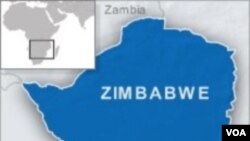WASHINGTON —
The international crisis group Monday voiced concerns over Zimbabwe’s pending election, after years of an uneasy power-sharing government between President Robert Mugabe and Prime Minister Morgan Tsvangirai.
In its report titled Zimbabwe: Election scenarios, ICG said the country may not be ready for elections, saying that widespread fear of violence and acts of intimidation witnessed in recent months contradicts political leaders’ stated commitments to peace.
The group cites lack of consensus and clarity in the Global Political Agreement reforms, the Southern African Development Community’s role in shaping a credible vote, and lack of support for pro-democracy institutions established under the GPA.
SADC in particular, IGC said: “Remains central to shaping a credible vote and legitimising its outcome. SADC must convene a heads of state summit on Zimbabwe that emphasises compliance with the community’s Principles and Guidelines Governing Democratic Elections”.
"It should also establish a liaison office in Harare to monitor and evaluate electoral preparations” while also supporting pro-democracy institutions established under the GPA including the Joint Monitoring and Implementation Committee and the Human Rights Commission.
The report also points to continued violations of the GPA, the lack of key reforms and the recent rejection of a united nations assessment mission as signs that any election may not be credible.
IGC’s southern African project director Piers Pigou said a credible election cannot take place until the GNU partners agree on fudnamental reforms.
Though the relationship between the major partners is strained, Mr. Pigou said progress on reforms is not impossible.
IGC implored Zimbabwe not rush into elections before addressing concerns as well as the practical implementation of necessary reforms. The group warns without the necessary reforms, deferring the vote may be appropriate.
In its report titled Zimbabwe: Election scenarios, ICG said the country may not be ready for elections, saying that widespread fear of violence and acts of intimidation witnessed in recent months contradicts political leaders’ stated commitments to peace.
The group cites lack of consensus and clarity in the Global Political Agreement reforms, the Southern African Development Community’s role in shaping a credible vote, and lack of support for pro-democracy institutions established under the GPA.
SADC in particular, IGC said: “Remains central to shaping a credible vote and legitimising its outcome. SADC must convene a heads of state summit on Zimbabwe that emphasises compliance with the community’s Principles and Guidelines Governing Democratic Elections”.
"It should also establish a liaison office in Harare to monitor and evaluate electoral preparations” while also supporting pro-democracy institutions established under the GPA including the Joint Monitoring and Implementation Committee and the Human Rights Commission.
The report also points to continued violations of the GPA, the lack of key reforms and the recent rejection of a united nations assessment mission as signs that any election may not be credible.
IGC’s southern African project director Piers Pigou said a credible election cannot take place until the GNU partners agree on fudnamental reforms.
Though the relationship between the major partners is strained, Mr. Pigou said progress on reforms is not impossible.
IGC implored Zimbabwe not rush into elections before addressing concerns as well as the practical implementation of necessary reforms. The group warns without the necessary reforms, deferring the vote may be appropriate.










